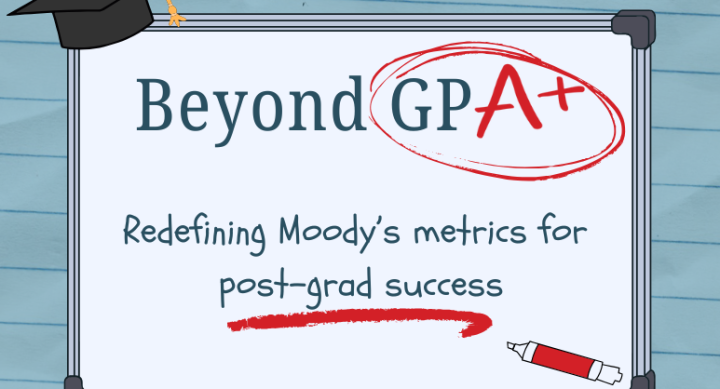
Unlike getting into the University of Texas at Austin, there is no auto-admission for the rapidly evolving communications job market. Today, students and faculty at the Moody College of Communication know that post-grad success is not determined solely by the traditional indicator: the grade-point average.
Mark Garcia, a journalism sophomore and transfer student, said his friends outside Moody seem more concerned about their GPAs.
“For them, it’s like, ‘If I don’t get good grades, I could kiss that job or that internship goodbye,’” Garcia said.
As a Moody major, Garcia said he believes his work ethic and portfolio will make him most marketable to employers. However, he also has noticed his Moody peers prioritize grades more than his former classmates at the University of Arkansas.
Autumn Palacio, a radio-television-film senior, said she doesn’t believe a high GPA is what will set her apart in the industry.
“At least in my major, it’s more about growing creatively, and it’s not really about getting an A or B on a project,” Palacio said. “I don’t think that matters.”
Palacio serves as videography editor for Afterglow, Moody’s music publication, and works for Bevo Video Productions.
Palacio said her goal in her courses is “to pass, but it’s more about taking what I learned in the class to apply it to outside (opportunities).”
Behr Rinke, a journalism junior, works as an undergraduate lab leader for COM 302, a course focused on resume and career development required for all Moody students. He teaches two sections, with a total of about 80 students.
In a recent lab, Rinke helped his students build their resumes. He said many of his students surprised him with their high GPAs, especially the sophomores and juniors.
“As Moody students, there is an emphasis on creative projects and experience outside of college,” Rinke said. “That is something where Moody differs, but I wouldn’t say that detracts from how much students are thinking about their GPA.”
Professor David Ryfe, director of the School of Journalism and Media, and professor Natalie Tindall, director of the Stan Richards School of Advertising & Public Relations, said hands-on experience is essential for Moody majors.
“It’s the culture of Moody and the culture of the degrees that are in here, where clinical experience, on-the-job training or on-set experience matters,” Tindall said. “It's the ethos of the careers, the ethos of the fields and the careers attached to those fields that force Moody to be a place where you have to do and learn and try all at the same time.”
This combination of coursework and professional experience helps students learn what they want to do after graduation.
“You assume that the sole purpose of college is to get good grades, but that isn’t the purpose,” Ryfe said. “The purpose of college is to spend several years figuring out what you’re going to do after.”
Ryfe said the current job market requires Moody students to be prepared to be flexible in their future careers.
“The average number of jobs that journalism students have in the first five years after graduation is three,” Ryfe said.
Ryfe added that while hands-on experience is key, having a high GPA can help open up opportunities after graduation.
“Your portfolio work is what is going to get you a job. That’s generally true for most Moody students in communications fields,” Ryfe said. “Having said that, your grades can matter for certain kinds of opportunities, whether it’s a fellowship, or graduate school. Why unnecessarily narrow the choices available to you when you really don’t know if you’d like to do that at some point in the future?”
However, the duo said hiring managers are recruiting more holistically today, so they are understanding if students have more family responsibilities or economic hardships than others.
Employers “want people who bring a diversity of skill sets, knowledge and viewpoints to the industry,” Tindall said.
There are no clear guidelines for what will ensure post-grad success for a Moody student. Students determine what they want to dedicate themselves to — and they determine how successful they will be in their efforts.
“Adulthood is not a place where you can pick and choose when you’re going to apply yourself,” Ryfe said. “You need to learn the practice of trying to be excellent all the time … and then give yourself grace when you fall short.”
